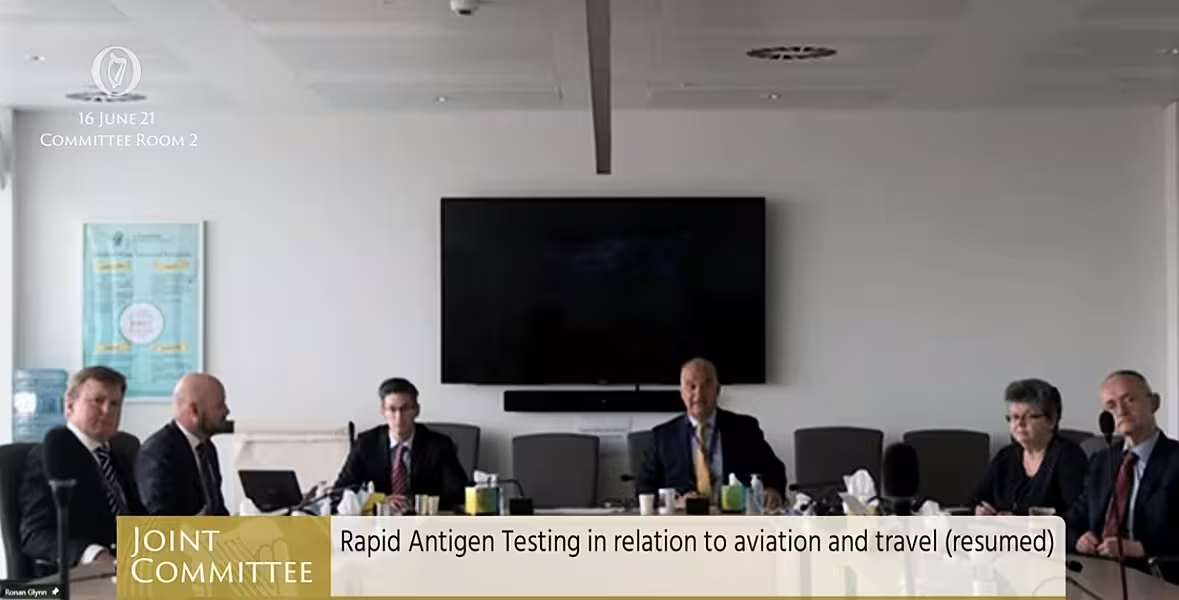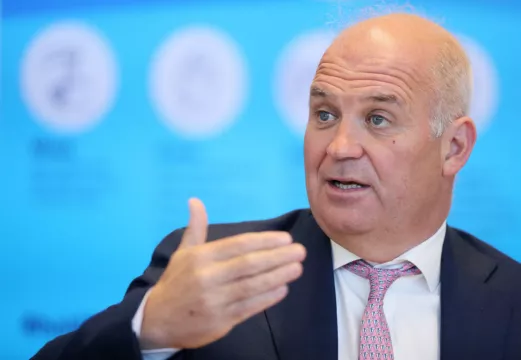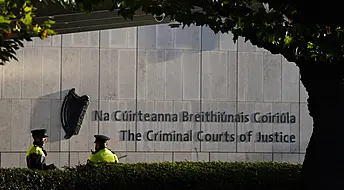Ireland’s chief medical officer has said there is no evidence or studies on the use of rapid antigen testing for the reopening of international travel.
Dr Tony Holohan also urged caution around the use of antigen tests to give the green light to restart activities, warning that it “poses several risks”.
Dr Holohan told the Oireachtas Transport Committee that tests cannot be rolled out on the basis of people thinking they are a good idea without scientific evidence.
Members of the National Public Health Emergency Team (Nphet) appeared before the committee.
They have continuously objected to the use of the rapid tests among the general public.

Dr Holohan said he has “no opposition whatsoever” to antigen testing but wants proper studies carried out on its use in the aviation sector.
“I’m not aware of any published data reported on these kinds of settings that apply to asymptomatic individuals,” Dr Holohan added.
“There are no independent, scientific studies published anywhere in the world that I know of.
“We can use antigen testing in any setting so long as we have validated the use of the testing and we know what a positive result means and a negative result means. We haven’t seen any evidence yet generating from that sector.”
Pilot scheme
Dr Holohan said there should be a pilot scheme run to test the efficacy of the antigen tests.
The tests are used in numerous EU countries, and the Government’s chief scientific adviser Dr Mark Ferguson has authored a report advocating their use, which has been adopted by Government.
Experts have also advocated the use of the tests which are fast and cheaper than Nphet-preferred PCR tests.
Fianna Fáil’s James O’Connor said he is “extremely concerned” around Ireland’s “lackadaisical approach” to the area of antigen testing.
“It is concerning to see Ireland a laggard in this respect,” Mr O’Connor added.
“We are arguably arriving at a position where Ireland will have its vaccination process completed towards the end of the summer or early autumn.
“Surely be to God we need to start looking at the implementation of antigen testing.”
Dr Holohan said that if Ireland is to apply antigen tests, it needs to have that backed up by well planned and organised validation studies to understand its impact.
“What we can’t do is simply roll out tests on the basis of people thinking they are a good idea without us supporting that with good quality scientific evidence generated from independent validated studies,” he added.
One in two cases missed
Dr Mary Keogan, a consultant immunologist, said that validation of tests is a normal part of diagnostics.
“Every test put into practice needs to be validated,” she added. “Antigen testing is rapid and easy.
“To do one test is rapid and easy, to do 100 is extremely labour-intensive.
“In the Barcelona concert at the end of March, 80 nurses were employed to work 12-hours days to get the people tested.
“It’s key to understand the enormous amount of work that is involved.”
Dr Cillian de Gascun warned that antigen tests do not perform to the same standards as the PCR test for the asymptomatic cohort.
“The PCR test is a better test, antigen tests, in the asymptomatic cohort, will miss one in every two cases,” Dr de Gascun added.
“That every one case may be infectious and may well be infected with the Delta variant or any other variant.”
Delta variant
Professor Philip Nolan said there is an increase in concern in relation to the Delta variant.
“It now accounts for 90 per cent of cases in the UK and for the past number of weeks we have seen that deteriorating situation with a 50 per cent increase week-on-week in the number of cases reported across the UK,” Prof Nolan added.
“That gives cause for concern.
“The ultimate measure is to stop travel, that is the only way to eliminate risk.
“The recommended approach now for overseas arrivals from Britain is that they have a negative PCR test prior to departure and a test at day five and then again at day 10.”
Dr Holohan said that when incidence is low and vaccinations are high, there can be a safe resumption of travel without the need for testing.
Dr Ronan Glynn pointed to tests carried out by the Infectious Diseases Society of America in recent weeks.
“It’s very simple, they said: 'For asymptomatic individuals who are at risk of exposure, a rapid PCR test should be used rather than a single rapid antigen test.'
“That’s their current position. It’s backed up by the Royal Statistical Society in the UK, and by the WHO.
“We have to be led by the evidence.
“If we move away from speaking about evidence, then all we are doing is looking at who speaks better. It’s opinion over fact.
“We have to be careful that we have to be led by what the evidence is telling us as opposed to what we want to be true.”







